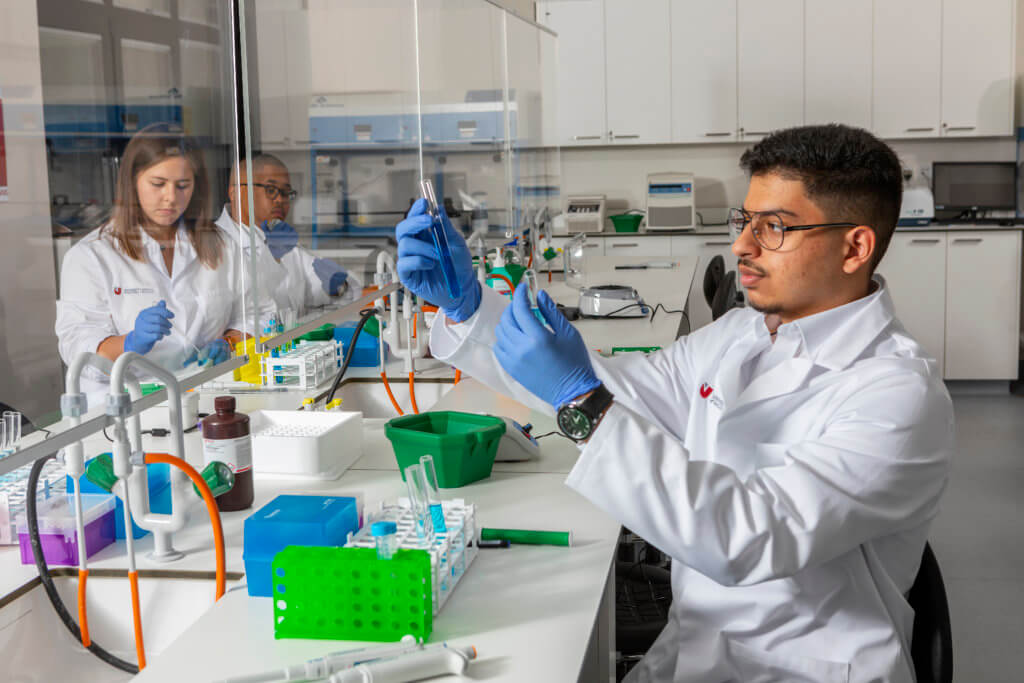When health disasters strike, it’s not just doctors who rise up to the occasion. Behind any successful surgery, near-impossible recovery, or medical breakthrough, there is an army of healthcare workers who contribute their expertise to save one more life. In high-pressure situations, even the best teams can falter in the absence of effective leadership to steer them through an emergency situation.
The need for more astute leadership in healthcare is the reason why the University of Nicosia (UNIC) Medical School is offering the unique Master of Science in Health Services Administration (MHSA) via distance learning. This three-semester programme is ideal for those with a prior degree in business or life sciences who wish to advance their careers in healthcare further. The course components borrow features of a typical MBA qualification but with a twist. The programme is specifically designed to serve the health services sector according to the highest global standards and offers graduates the necessary skills to lead an organisation.
As a UNIC Medical School student, you’ll never have to second-guess the quality of your education. It boasts a rare triple recognition for excellence in online education, a feat awarded to only a small cohort of universities in Europe. UNIC’s distance learning is acknowledged by the European Association of Distance Teaching Universities (EADTU) and the European Foundation for Quality in e-Learning (EFQUEL).

Reem Obeidi thoroughly enjoyed online lessons. Source: UNIC Medical School
“What I like the most about the course is that it is taught online, with the possibility to watch classes every week at your own time and interact on live classes via webinars. I was impressed by the way information was passed to students in a very intelligible form.”
A pioneer in every way, UNIC is also the first university in the European continent to earn a five-star rating for distance learning by QS Stars, a leading global university-rating agency. UNIC is ranked 32nd in the world in the core area of Quality Education by Times Higher Education, which cements its well-deserved reputation as a world-class education provider.
Future-forward healthcare through digital competency
The COVID-19 pandemic is a crucial example of how rapid and effective response to emergencies, in combination with long-term solutions in resource management, are critical to maintaining a robust healthcare system. MHSA students acquire skills that enable them to competently respond to crises that prioritise patient safety while making split-second decisions in resource distribution when operating at full capacity.

The MHSA’s curriculum emphasises modern technology that is currently reshaping the industry. Source: UNIC Medical School
“We live in very challenging times as far as the entire health services sector is concerned. New innovative approaches and emerging technologies will fundamentally reshape the future of health services. More importantly, critical situations like the COVID-19 pandemic accelerate the pace of change and ensure that this future is beginning now,” remarks Dr Elena Critselis, the Head of Department of Primary Care and Population Health and MHSA Programme Coordinator.
“More than ever, it is now necessary for health services managers and professionals to acquire competencies in a multitude of new and emerging areas of health management. And this is exactly where this very modern programme aims to provide,” she adds.
MHSA is as contemporary as it comes: what distinguishes it from other programmes in healthcare is the curriculum’s emphasis on modern technology that are currently reshaping the industry. Students will use big data for accurate quantitative analysis to improve decision outcomes in patient care, in addition to using blockchain technology to facilitate the secure exchange of sensitive medical information across various sectors.
Collaborating with the university’s Institute For the Future — the first university in the world to offer degree programmes in digital currency and blockchains — MHSA students will learn from the best experts on how the technology disrupts current health services. Graduates will learn how to leverage emerging technologies to push for advancements in areas such as precision medicine, population health, insurance fraud, genomics and ePrescriptions, to name a few. By the end of their studies, graduates will gain competencies in how digital and wearable technologies can enhance healthcare operations.

MHSA students are given the option to complete a research or field project in their final semester. Source: UNIC Medical School
Practical, solution-based approach to healthcare management
Diving into new avenues in healthcare isn’t complete without hands-on experience. This is why the MHSA students are given the option to complete a research or field project in their final semester, where real-world applications can be made through executing business plans relevant to healthcare services.
You can create your own blueprint on how to run a post-operative rehabilitation centre, or solve problems on medical resource distribution in high-risk environments. Either way, an MHSA degree thoroughly prepares you for emerging challenges in healthcare administration and business, with full guidance from a personal mentor matched to each student from day one.
“I would definitely recommend the MHSA programme for others. The material is delivered in a very comprehensible manner. The weekly exercises are provided with answers, interaction is provided in the forum discussions, and more importantly, university staff is always there for you,” says Obeidi, who gained a wider appreciation for the MHSA degree when she saw how it helped her master the administrative aspects of her profession as a medical nurse.
To find out how you can become a leader in health administration at UNIC Medical School, click here.
Follow the University of Nicosia Medical School on Facebook, Twitter, Instagram, LinkedIn, and YouTube.











